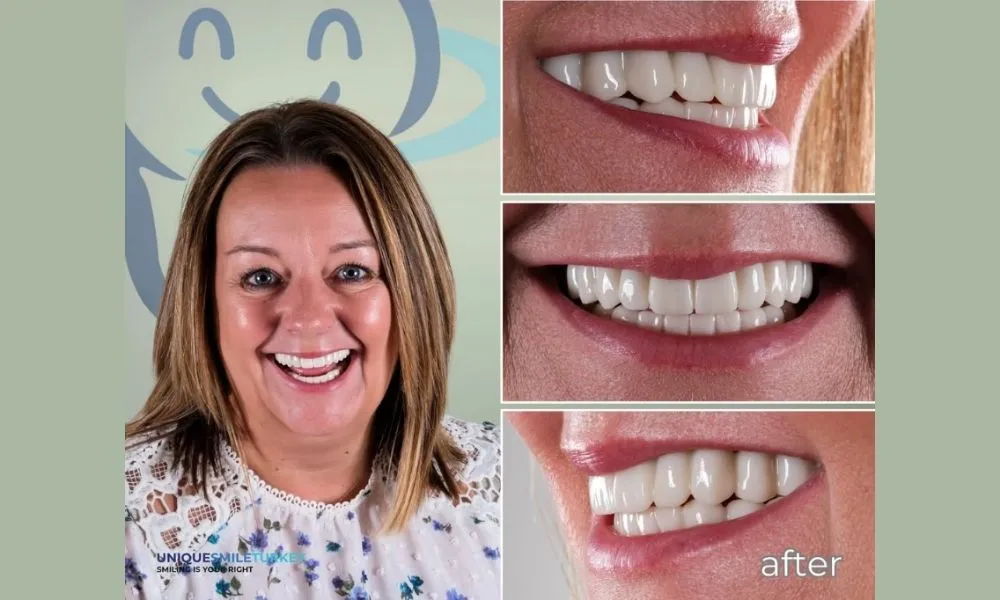


Thinking about fixing a damaged or discoloured tooth? Dental crowns might be just what you need. And Antalya is a top spot for dental crowns. You get quality care, modern clinics, and fair prices.
Treatment takes about a week. Most clinics help with travel and hotel, too.
Want a better smile while on holiday? Antalya makes it easy.
It's a strong shell placed over a damaged or weak tooth. It brings back its shape and function.
Got a cracked tooth or big filling? A crown keeps it safe and steady.
Most are made from zirconia or E-max. Zirconia dental crown and Emax look natural and last for years.
Think of it as a fresh start for your tooth, stronger, cleaner, and ready to go.

There are several types of dental crowns. Crowns aren't all the same. Some shine more, some stay strong longer. Picking the right one depends on what you need and where it's going in your mouth.
These are all about looks. No metal inside, just ceramic. They reflect light like real teeth, which makes them perfect for dental crown front tooth
They're not the strongest, though. If you grind your teeth or bite down hard, your dentist might suggest a tougher material.
Want a crown that blends in naturally? This is the go-to.
Emax crowns are a stronger kind of ceramic. Slim, shiny, and tough enough for most smiles.
They need less trimming of your natural tooth, and they look amazing especially under light.
Best spot? Front or side teeth that show when you talk or laugh.

Zirconium is the heavyweight. Solid, durable and white. Not as see-through as Emax, but way stronger.
Molar area? Clench your teeth? This is best choice.
It's also kind to gums and doesn't cause irritation. Win-win.
Not aesthetic, but super tough. Metal crowns don't crack or chip. That's why dentists use them for back molars.
They're usually made of mixed metals. And yes, they stand out but they don't quit.
Strongest one out there? Metal crowns might be it.
PFM crowns are the “half-and-half” option. Metal inside, porcelain outside. So, they're strong and look like your natural teeth.
They are good choice. But sometimes, the metal line at the gum shows after a while. And the outer layer can chip if you bite hard stuff.
Yes, they're still around and not just for show. Gold crowns are gentle, super durable, and fit like a glove.
They don't crack, they don't wear down, and they don't hurt other teeth.
You won't see them much in the front, but for back teeth? Still one of the best choices out there.
Anyone with a damaged, weakened, or missing tooth might need a crown. Age doesn't really matter. What matters is the condition of your tooth and what the dentist wants to protect or restore.
Have a root canal? You probably need one.
Got a dental implant? You definitely need one.
Cracked or chipped a visible tooth? A crown can fix the look and the function.
Crowns are also used to stop a weak tooth from breaking further. So, if your tooth structure is not strong enough for a filling, your dentist may suggest a crown instead.
And yes, some people get crowns just to improve their smile. Not every crown is about damage, sometimes it's just about aesthetic.
Crowns aren't just for one thing. There are a few clear situations where they're the best (or only) option.
Let's look at the most common ones.
Every dental implant needs a crown. Once the titanium screw is placed into the jawbone and heals, a crown goes on top to act as the visible part of the tooth.
It's not just for looks. This crown lets you chew normally and keeps the spacing between your other teeth correct.
No crown on an implant? The treatment stays unfinished.

After a root canal, the tooth becomes hollowed out. That makes it more fragile. A filling alone isn't enough in most cases.
To prevent the tooth from cracking or breaking later on, dentists usually place a crown over it.
Especially if it's a back tooth, a crown after a root canal is almost always needed.
If the cavity is small, a filling is fine. But when too much of the tooth is gone, there's no structure left to hold a filling.
That's when a dental crown steps in. It covers the entire tooth and gives it strength to handle chewing again.
So, if your dentist says the decay is deep or large, that usually means a crown is the better (and safer) solution.
Sometimes it's not about pain, it's about the way the tooth looks. If you have chipped, cracked, or badly discolored teeth, crowns fix the shape, color, and symmetry.
They're often used in smile makeovers too. Especially in front teeth, where veneers might not be enough.
A crown can fully cover the tooth and make it look brand new.
And the best part? It also strengthens the tooth at the same time. So, it's both cosmetic and protective.
Getting a tooth crown in Turkey is actually quick and smooth. Here's how dental crown procedure goes.
First, you meet the dentist. Dental crown preparation happens in this period. They check your tooth, maybe take an X-ray, and help you choose the right material, like zirconia or E-max.
Next, the tooth gets reshaped a bit. You don't feel pain because they numb the area.
Then comes the 3D scan. It replaces the old, messy impressions. Much faster and more precise.
Some clinics make your crown the same day. Others send the scan to a lab. If there's a wait, they place a temporary one.
On your last visit, the dentist fits the real crown. They check the bite, make small adjustments, and fix it in place with dental glue for a crown
How long does it take? Usually 3–5 days. Most clinics also help with travel, hotel, and translation.
Crowns are super useful, but they're not perfect. Let's go over what's great and what to keep in mind.
They protect weak or damaged teeth. They improve how your smile looks. They're strong enough to handle chewing. And with the right material (like zirconia or Emax) they can last over 10 years.
They also fit tightly, so they help prevent future decay under the crown. Bonus? If you choose carefully, they'll blend in with your real teeth.
Can they fix both health and looks? Yes, that's why dentists love them.
They require shaping your natural tooth, which can't be undone. If not done properly, food might get trapped or the crown might feel bulky.
Also, no crown lasts forever. You'll still need to care for it, daily brushing, flossing, and check-ups.
And depending on the material, some dental crowns cost more or don't look quite as natural.
Crowns last long, but only if you treat them well. Here's what really makes the difference:
Brush and floss every day. Crowns don't decay, but the tooth under them still can.
Avoid chewing ice or hard candy. Even the strongest crown can crack.
Use a night guard if you grind your teeth while sleeping. It's a small thing, but it protects a big investment.
Don't skip your dental check-ups. A dentist can spot early issues before they become expensive problems.
One small habit, big result? Flossing. That's the one most people ignore but it keeps your crown and gums healthy.
Here's a quick look at average dental crown prices in different countries. These are per crown and can vary depending on material and clinic.
|
Country |
Average Price (Per Crown) |
|
Turkey |
€200 – €350 |
|
Germany |
€700 – €1,000 |
|
UK |
£600 – £900 |
|
France |
€600 – €850 |
|
Netherlands |
€750 – €1,200 |
|
USA |
$1,000 – $2,000 |
Turkey offers the same quality as many top European clinics but at a much more affordable costs for dental crowns. On top of that, there's no long waiting time like in many EU countries. You get fast service, modern tech, and experienced dentists all in one place.
Of course, the final price depends on a few things: the dentist's pricing policy, the type and brand of material used, how many sessions are needed, and whether you need any extra treatments. But even with all that, the total cost in Turkey usually stays far below what you'd pay elsewhere.
Because the costs of running a clinic are much lower. Dentists don't pay as much for rent, staff, or lab work. But the materials? Same as in Europe or the U.S.
Turkey also has thousands of qualified dentists. Competition is high, so prices stay low. And many clinics offer full packages, crown, hotel, airport pick-up at one clear price.
Cheap means bad? No. The quality is high, just the costs are lower.
Yes, it's safe. Dentists in Turkey are well-trained and clinics are strictly regulated by the Ministry of Health. They follow hygiene rules and use international-quality materials.
Clinics that don't follow the rules get fined or shut down.
Most also use the latest technology. And there are tons of real reviews and dental crowns before and after photos online. So, it's easy to check who's good.
A dental crown covers the entire tooth. It's used when the tooth is broken, weak, or treated with a root canal.
An inlay fits inside the tooth. It's used when there's moderate decay, but the tooth is still strong.
If most of the tooth is damaged, you'll need a crown.
If only a small part needs fixing, an inlay is enough.
|
Feature |
Crown |
Inlay |
|
Coverage |
Full tooth |
Inside tooth |
|
Tooth removal |
More |
Less |
|
Strength |
Higher |
Moderate |
|
Use case |
Weak/broken tooth |
Medium decay |
|
Cost |
Higher |
Lower |
|
Look |
Natural finish |
Tooth-colored fit |
Usually 10–15 years. With good care, even 20+. Brush well, avoid hard foods, and visit your dentist regularly.
No. The area is numbed before treatment, so you won't feel pain. After the crown is placed, there might be mild sensitivity for a few days, but that goes away fast.
Yes, it can. If bacteria sneak under the crown (because of poor cleaning or a loose fit) decay can start. That's why daily brushing and flossing matter.
It could be decay, staining, or the edge of a metal-based crown showing. Only your dentist can know for sure. It's best to get it checked early.
Not directly. But if food gets stuck around the crown or if there's a gap, bacteria can build up. That can lead to bad breath. Keep it clean, and you're fine.
Sometimes. A small chip can be fixed. But if the crown is cracked or loose, it usually needs replacement. Let your dentist decide.
|
Feature |
Crown |
Veneer |
|
Coverage |
Entire tooth |
Front surface only |
|
Tooth preparation |
More shaving |
Minimal shaving |
|
Purpose |
Protection + function |
Cosmetic improvement |
|
Strength |
Very strong |
Less strong |
|
Placement area |
Front + back teeth |
Mostly front teeth |
|
Durability |
10–15+ years |
7–10 years |
|
Used for |
Broken/weak teeth |
Color/shape correction |
Need full protection and function? Go with a crown.
Just want to improve the look? A veneer is enough.
Because it's not just another dental clinic, it's a team of experienced professionals, including professors and specialists in their fields. You're treated by dentists who don't just follow the latest techniques, they teach them.
Unique Smile Turkey uses advanced technology, top-quality materials, and offers personalized care in a modern, hygienic setting. From smile makeovers to full-mouth treatments, every step is carefully planned by experts.
Plus, they're known for clear communication, honest pricing, and international patient support from travel to treatment.
Expert hands. Clear results. Trusted by many.